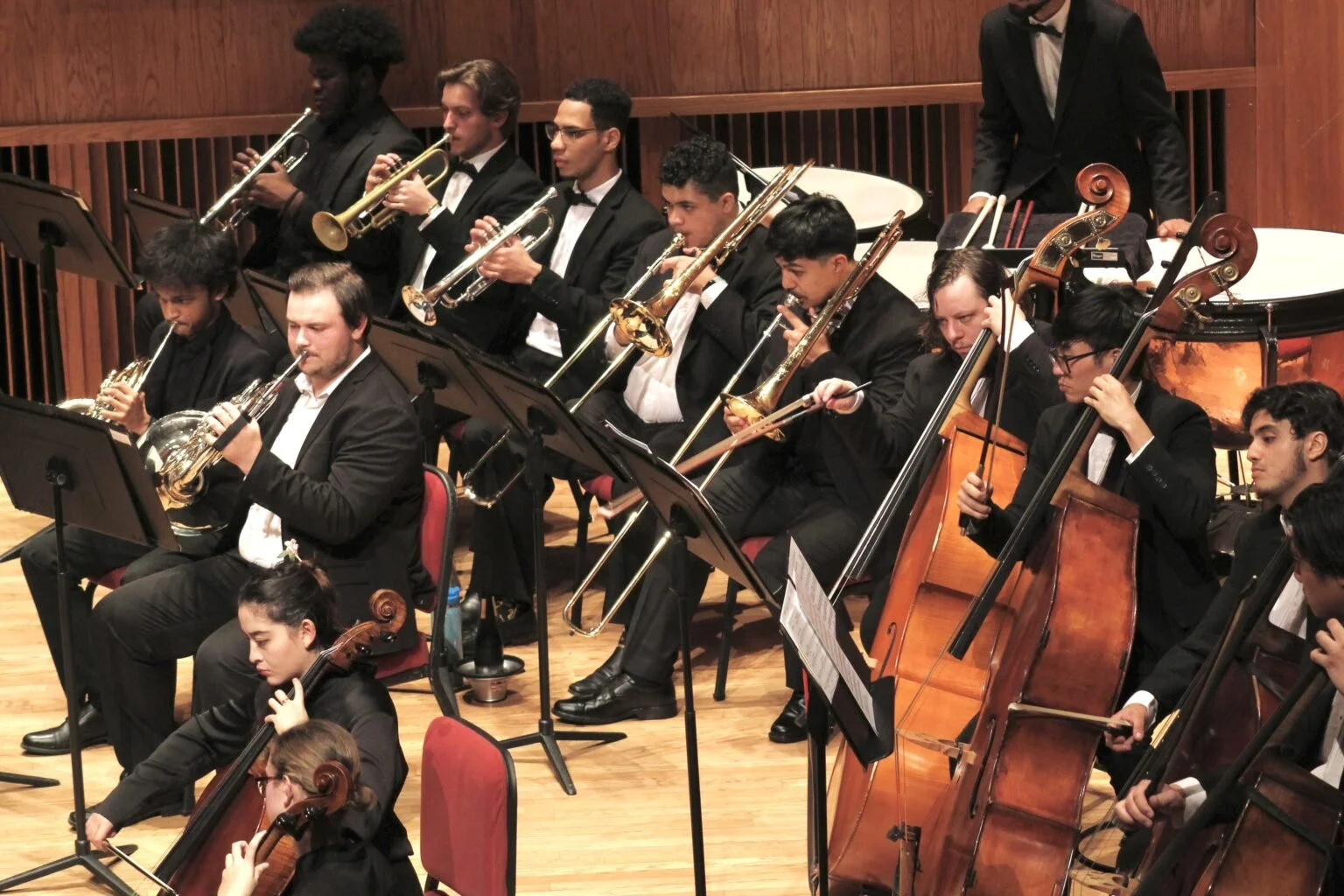
The Aaron Copland School of Music’s Fall ’24 Season
The young artists of the Aaron Copland School of Music (ACSM) at Queens College prepare for an entire semester’s worth of new repertoire as they return to campus, following a summer full of programs and competitions.
Each sector of the music department, regardless of age or degree-level, has selected programs focused on nourishing the minds and skill sets of students. With performances spanning from jocular Cavallian opera to shimmering Stravinskian suites, ACSM’s Fall 2024 season contains programs guaranteed to satisfy the ear of any music enthusiast.
The Queens College Orchestra (QCO) has programmed three invigorating concerts this season under the direction of revered Maestro Ming-Feng Hsin. Featuring iconic works of Mozart, alongside the romantic, sweeping melodies of Dvořák and Sibelius, QCO’s repertoire selection highlights legendary works of highly esteemed composers. The first concert is scheduled for Oct. 1st at 7:30 p.m., when QCO will perform Beethoven’s “Egmont” Overture, Respighi’s “Pines of Rome”, and Dvořák’s emblematic “New World Symphony” (No.9).
QCO’s second concert is set for Oct. 30th at 12:15 p.m., with a program that consists of Mozart’s Overture to “The Magic Flute” and Sibelius’ ‘Symphony No. 2.” For their final concert, scheduled for Dec. 12th at 7:30 p.m., QCO is set to perform Mozart’s iconic “Eine Kleine Nachtmusik,” Bloch’s “Schelomo: Rhapsodie Hébraïque” featuring undergraduate cellist, Sean Waite, and Stravinsky’s “The Firebird” Suite.
Waite was a winner of ACSM’s Spring 2024 Concerto Competition, alongside graduate vocalist Lydia Saylor, who will perform Copland’s “Twelve Poems of Emily Dickinson” with QCO during the upcoming spring semester.
Waite spoke to The Knight News and said, “the bulk of my preparation, aside from the usual tedious work on various runs and melodious passages throughout the piece, was listening to it over and over again. Listening to the pieces you’re studying for hours on end really is the best way to get them in your head.” Waite’s expressive embodiment of Bloch’s work is truly a marvel to witness as his rich tone and musical prowess speaks for themselves.
The Queens College Vocal Ensemble has assembled a rather diverse program of choral compositions spanning from the sacred works of Anton Bruckner, to the rhythmic South-Asian inspired melodies of Reena Esmail. This program, curated by conductor Dr. James John, encompasses a plethora of styles, musical eras, and backgrounds.
Lily Negroponte, undergraduate vocalist and chorister, shared that, in regards to this semester’s diverse repertoire choice, they are exploring a lot of different topics instead of narrowing down into one specific area. Thus, they are creating a more worldly view of music.
“I appreciate this construction of a program because it offers students a greater variety of music, which can make rehearsals a lot more exciting,” Negroponte said.
Vocal Ensemble has three concerts already scheduled: Nov. 1st at 7:30 p.m. in LeFrak Concert Hall, Nov. 3rd at 4 p.m. at the Good Shepherd-Faith Presbyterian Church in Manhattan, and Dec. 13th at 7:30 p.m. in LeFrak Concert Hall.
The Wind Ensemble, ACSM’s other major instrumental group, recently came under the direction of conductor Thomas Oberle. The group will perform an assortment of works, all which seemingly offer audience members very different listening experiences. From Clare Grundman’s “An Irish Rhapsody,” which features six Irish folk songs, to Robert Russell Bennett’s jazzy “Suite of Old American Dances,” this season of Wind Ensemble’s selection of repertoire creates a diverse soundscape, encompassing a plethora of musical styles. Their concert is scheduled for Dec. 3rd at 7:30 p.m. in LeFrak Concert Hall.
The QC Opera Studio has two remarkable operas scheduled this season: Francesco Cavalli’s “Il Giasone” and Gian Carlo Menotti’s “Amahl and the Night Visitors.” The two operas display a great deal of diversity within the department, as the two pieces exhibit vastly different stylistic conventions. “Il Giasone,” a 17th-century Baroque-era opera, is riddled with recitative, basso continuo, and features cheeky and ostentatious humor, while “Amahl and the Night Visitors” embodies a more traditional interpretation whilst maintaining its 20th century musical flair.
Cavalli’s “Il Giasone” is scheduled for Nov. 21st and 22nd at 7:30 p.m. in LeFrak Concert Hall, and Menotti’s “Amahl and the Night Visitors” is scheduled for early December in Music Building Room 270.
Annalisa Emmett, graduate vocalist cast in the role of Medea in “Il Giasone,” discussed her musical experience with recitative thus far in the process. She explained, “this style of music is very new to me. Learning the music has been a challenge, but it’s been exciting since recitative is such an important part of opera.”
Recitative is best described as speech-like singing in operatic settings that doesn’t conform to a strict rhythmic scheme, but instead emulates spontaneous declamation. It often furthers the plot and emphasizes the text through monologic reflection or carrying dialogue between two characters.
In regards to the analysis of the aspects of Medea’s character, Emmett disclosed the following: “It’s fun to think about what I relate to within this character, as well as how she’s different from me as a person. Even concerning the differences — at her core I would say that Medea is very passionate. Sometimes her motives are a little questionable, but when she sets her mind to something she gets it done… she’s stubborn, and I can relate to that.”
The School of Music here at Queens College serves as a beacon of creativity and collaboration. Through the many performances it offers to the public, it celebrates the accomplishments of its students.
Read it on TKN’s website here!